Jiaqi Huang
ECHO-2: A Large-Scale Distributed Rollout Framework for Cost-Efficient Reinforcement Learning
Feb 03, 2026Abstract:Reinforcement learning (RL) is a critical stage in post-training large language models (LLMs), involving repeated interaction between rollout generation, reward evaluation, and centralized learning. Distributing rollout execution offers opportunities to leverage more cost-efficient inference resources, but introduces challenges in wide-area coordination and policy dissemination. We present ECHO-2, a distributed RL framework for post-training with remote inference workers and non-negligible dissemination latency. ECHO-2 combines centralized learning with distributed rollouts and treats bounded policy staleness as a user-controlled parameter, enabling rollout generation, dissemination, and training to overlap. We introduce an overlap-based capacity model that relates training time, dissemination latency, and rollout throughput, yielding a practical provisioning rule for sustaining learner utilization. To mitigate dissemination bottlenecks and lower cost, ECHO-2 employs peer-assisted pipelined broadcast and cost-aware activation of heterogeneous workers. Experiments on GRPO post-training of 4B and 8B models under real wide-area bandwidth regimes show that ECHO-2 significantly improves cost efficiency while preserving RL reward comparable to strong baselines.
RelayGR: Scaling Long-Sequence Generative Recommendation via Cross-Stage Relay-Race Inference
Jan 05, 2026Abstract:Real-time recommender systems execute multi-stage cascades (retrieval, pre-processing, fine-grained ranking) under strict tail-latency SLOs, leaving only tens of milliseconds for ranking. Generative recommendation (GR) models can improve quality by consuming long user-behavior sequences, but in production their online sequence length is tightly capped by the ranking-stage P99 budget. We observe that the majority of GR tokens encode user behaviors that are independent of the item candidates, suggesting an opportunity to pre-infer a user-behavior prefix once and reuse it during ranking rather than recomputing it on the critical path. Realizing this idea at industrial scale is non-trivial: the prefix cache must survive across multiple pipeline stages before the final ranking instance is determined, the user population implies cache footprints far beyond a single device, and indiscriminate pre-inference would overload shared resources under high QPS. We present RelayGR, a production system that enables in-HBM relay-race inference for GR. RelayGR selectively pre-infers long-term user prefixes, keeps their KV caches resident in HBM over the request lifecycle, and ensures the subsequent ranking can consume them without remote fetches. RelayGR combines three techniques: 1) a sequence-aware trigger that admits only at-risk requests under a bounded cache footprint and pre-inference load, 2) an affinity-aware router that co-locates cache production and consumption by routing both the auxiliary pre-infer signal and the ranking request to the same instance, and 3) a memory-aware expander that uses server-local DRAM to capture short-term cross-request reuse while avoiding redundant reloads. We implement RelayGR on Huawei Ascend NPUs and evaluate it with real queries. Under a fixed P99 SLO, RelayGR supports up to 1.5$\times$ longer sequences and improves SLO-compliant throughput by up to 3.6$\times$.
P/D-Device: Disaggregated Large Language Model between Cloud and Devices
Aug 12, 2025Abstract:Serving disaggregated large language models has been widely adopted in industrial practice for enhanced performance. However, too many tokens generated in decoding phase, i.e., occupying the resources for a long time, essentially hamper the cloud from achieving a higher throughput. Meanwhile, due to limited on-device resources, the time to first token (TTFT), i.e., the latency of prefill phase, increases dramatically with the growth on prompt length. In order to concur with such a bottleneck on resources, i.e., long occupation in cloud and limited on-device computing capacity, we propose to separate large language model between cloud and devices. That is, the cloud helps a portion of the content for each device, only in its prefill phase. Specifically, after receiving the first token from the cloud, decoupling with its own prefill, the device responds to the user immediately for a lower TTFT. Then, the following tokens from cloud are presented via a speed controller for smoothed TPOT (the time per output token), until the device catches up with the progress. On-device prefill is then amortized using received tokens while the resource usage in cloud is controlled. Moreover, during cloud prefill, the prompt can be refined, using those intermediate data already generated, to further speed up on-device inference. We implement such a scheme P/D-Device, and confirm its superiority over other alternatives. We further propose an algorithm to decide the best settings. Real-trace experiments show that TTFT decreases at least 60%, maximum TPOT is about tens of milliseconds, and cloud throughput increases by up to 15x.
SAM-R1: Leveraging SAM for Reward Feedback in Multimodal Segmentation via Reinforcement Learning
May 28, 2025Abstract:Leveraging multimodal large models for image segmentation has become a prominent research direction. However, existing approaches typically rely heavily on manually annotated datasets that include explicit reasoning processes, which are costly and time-consuming to produce. Recent advances suggest that reinforcement learning (RL) can endow large models with reasoning capabilities without requiring such reasoning-annotated data. In this paper, we propose SAM-R1, a novel framework that enables multimodal large models to perform fine-grained reasoning in image understanding tasks. Our approach is the first to incorporate fine-grained segmentation settings during the training of multimodal reasoning models. By integrating task-specific, fine-grained rewards with a tailored optimization objective, we further enhance the model's reasoning and segmentation alignment. We also leverage the Segment Anything Model (SAM) as a strong and flexible reward provider to guide the learning process. With only 3k training samples, SAM-R1 achieves strong performance across multiple benchmarks, demonstrating the effectiveness of reinforcement learning in equipping multimodal models with segmentation-oriented reasoning capabilities.
Separate to Collaborate: Dual-Stream Diffusion Model for Coordinated Piano Hand Motion Synthesis
Apr 14, 2025Abstract:Automating the synthesis of coordinated bimanual piano performances poses significant challenges, particularly in capturing the intricate choreography between the hands while preserving their distinct kinematic signatures. In this paper, we propose a dual-stream neural framework designed to generate synchronized hand gestures for piano playing from audio input, addressing the critical challenge of modeling both hand independence and coordination. Our framework introduces two key innovations: (i) a decoupled diffusion-based generation framework that independently models each hand's motion via dual-noise initialization, sampling distinct latent noise for each while leveraging a shared positional condition, and (ii) a Hand-Coordinated Asymmetric Attention (HCAA) mechanism suppresses symmetric (common-mode) noise to highlight asymmetric hand-specific features, while adaptively enhancing inter-hand coordination during denoising. The system operates hierarchically: it first predicts 3D hand positions from audio features and then generates joint angles through position-aware diffusion models, where parallel denoising streams interact via HCAA. Comprehensive evaluations demonstrate that our framework outperforms existing state-of-the-art methods across multiple metrics.
MetaFold: Language-Guided Multi-Category Garment Folding Framework via Trajectory Generation and Foundation Model
Mar 11, 2025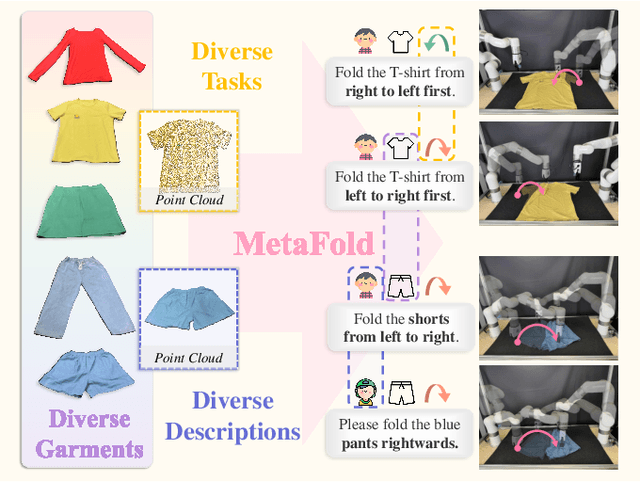
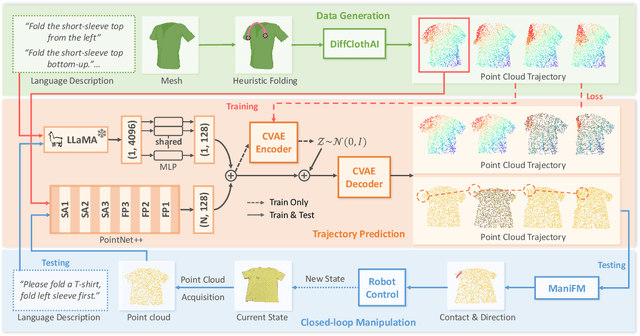
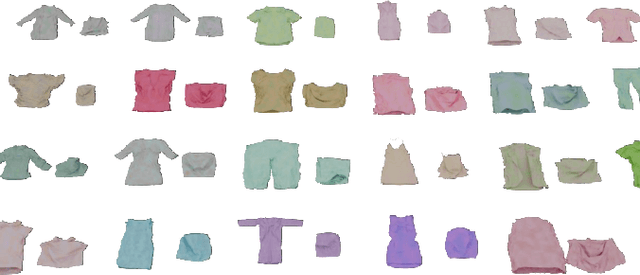
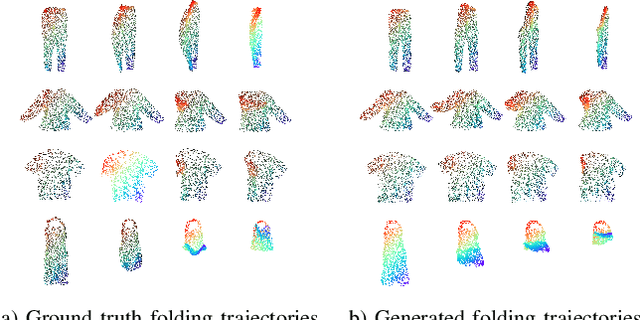
Abstract:Garment folding is a common yet challenging task in robotic manipulation. The deformability of garments leads to a vast state space and complex dynamics, which complicates precise and fine-grained manipulation. Previous approaches often rely on predefined key points or demonstrations, limiting their generalization across diverse garment categories. This paper presents a framework, MetaFold, that disentangles task planning from action prediction, learning each independently to enhance model generalization. It employs language-guided point cloud trajectory generation for task planning and a low-level foundation model for action prediction. This structure facilitates multi-category learning, enabling the model to adapt flexibly to various user instructions and folding tasks. Experimental results demonstrate the superiority of our proposed framework. Supplementary materials are available on our website: https://meta-fold.github.io/.
Detecting Backdoor Attacks via Similarity in Semantic Communication Systems
Feb 06, 2025Abstract:Semantic communication systems, which leverage Generative AI (GAI) to transmit semantic meaning rather than raw data, are poised to revolutionize modern communications. However, they are vulnerable to backdoor attacks, a type of poisoning manipulation that embeds malicious triggers into training datasets. As a result, Backdoor attacks mislead the inference for poisoned samples while clean samples remain unaffected. The existing defenses may alter the model structure (such as neuron pruning that potentially degrades inference performance on clean inputs, or impose strict requirements on data formats (such as ``Semantic Shield" that requires image-text pairs). To address these limitations, this work proposes a defense mechanism that leverages semantic similarity to detect backdoor attacks without modifying the model structure or imposing data format constraints. By analyzing deviations in semantic feature space and establishing a threshold-based detection framework, the proposed approach effectively identifies poisoned samples. The experimental results demonstrate high detection accuracy and recall across varying poisoning ratios, underlining the significant effectiveness of our proposed solution.
Densely Connected Parameter-Efficient Tuning for Referring Image Segmentation
Jan 15, 2025Abstract:In the domain of computer vision, Parameter-Efficient Tuning (PET) is increasingly replacing the traditional paradigm of pre-training followed by full fine-tuning. PET is particularly favored for its effectiveness in large foundation models, as it streamlines transfer learning costs and optimizes hardware utilization. However, the current PET methods are mainly designed for single-modal optimization. While some pioneering studies have undertaken preliminary explorations, they still remain at the level of aligned encoders (e.g., CLIP) and lack exploration of misaligned encoders. These methods show sub-optimal performance with misaligned encoders, as they fail to effectively align the multimodal features during fine-tuning. In this paper, we introduce DETRIS, a parameter-efficient tuning framework designed to enhance low-rank visual feature propagation by establishing dense interconnections between each layer and all preceding layers, which enables effective cross-modal feature interaction and adaptation to misaligned encoders. We also suggest using text adapters to improve textual features. Our simple yet efficient approach greatly surpasses state-of-the-art methods with 0.9% to 1.8% backbone parameter updates, evaluated on challenging benchmarks. Our project is available at \url{https://github.com/jiaqihuang01/DETRIS}.
IDEA: Image Description Enhanced CLIP-Adapter
Jan 15, 2025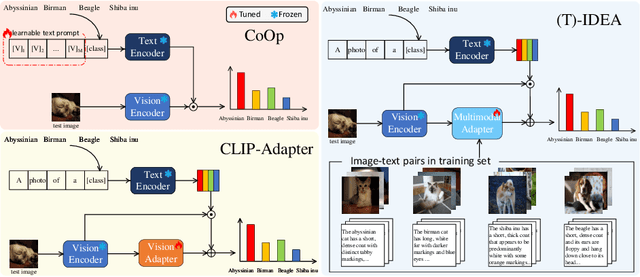
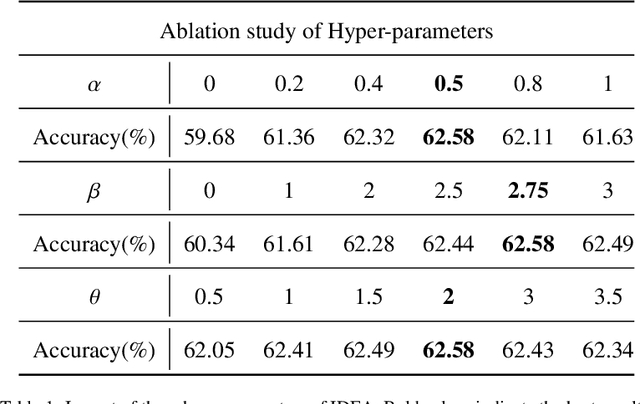
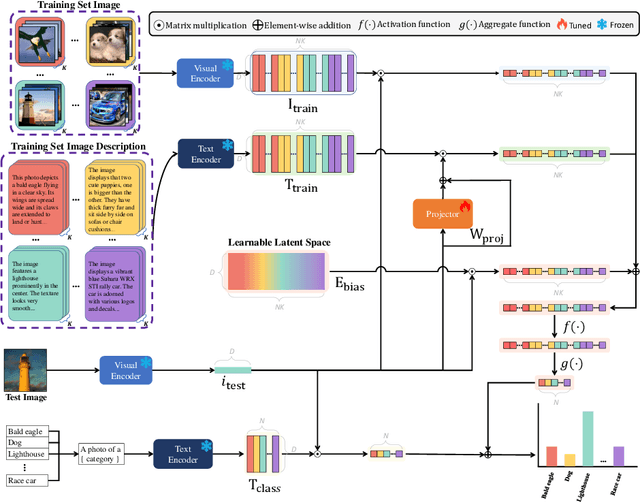
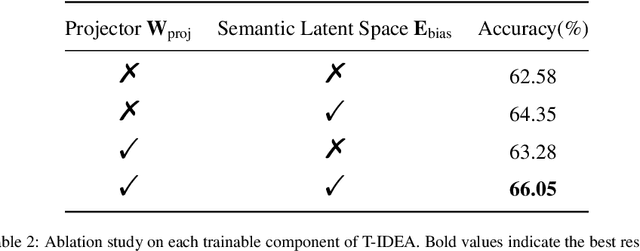
Abstract:CLIP (Contrastive Language-Image Pre-training) has attained great success in pattern recognition and computer vision. Transferring CLIP to downstream tasks (e.g. zero- or few-shot classification) is a hot topic in multimodal learning. However, current studies primarily focus on either prompt learning for text or adapter tuning for vision, without fully exploiting the complementary information and correlations among image-text pairs. In this paper, we propose an Image Description Enhanced CLIP-Adapter (IDEA) method to adapt CLIP to few-shot image classification tasks. This method captures fine-grained features by leveraging both visual features and textual descriptions of images. IDEA is a training-free method for CLIP, and it can be comparable to or even exceeds state-of-the-art models on multiple tasks. Furthermore, we introduce Trainable-IDEA (T-IDEA), which extends IDEA by adding two lightweight learnable components (i.e., a projector and a learnable latent space), further enhancing the model's performance and achieving SOTA results on 11 datasets. As one important contribution, we employ the Llama model and design a comprehensive pipeline to generate textual descriptions for images of 11 datasets, resulting in a total of 1,637,795 image-text pairs, named "IMD-11". Our code and data are released at https://github.com/FourierAI/IDEA.
DSDE: Using Proportion Estimation to Improve Model Selection for Out-of-Distribution Detection
Nov 03, 2024



Abstract:Model library is an effective tool for improving the performance of single-model Out-of-Distribution (OoD) detector, mainly through model selection and detector fusion. However, existing methods in the literature do not provide uncertainty quantification for model selection results. Additionally, the model ensemble process primarily focuses on controlling the True Positive Rate (TPR) while neglecting the False Positive Rate (FPR). In this paper, we emphasize the significance of the proportion of models in the library that identify the test sample as an OoD sample. This proportion holds crucial information and directly influences the error rate of OoD detection.To address this, we propose inverting the commonly-used sequential p-value strategies. We define the rejection region initially and then estimate the error rate. Furthermore, we introduce a novel perspective from change-point detection and propose an approach for proportion estimation with automatic hyperparameter selection. We name the proposed approach as DOS-Storey-based Detector Ensemble (DSDE). Experimental results on CIFAR10 and CIFAR100 demonstrate the effectiveness of our approach in tackling OoD detection challenges. Specifically, the CIFAR10 experiments show that DSDE reduces the FPR from 11.07% to 3.31% compared to the top-performing single-model detector.
 Add to Chrome
Add to Chrome Add to Firefox
Add to Firefox Add to Edge
Add to Edge